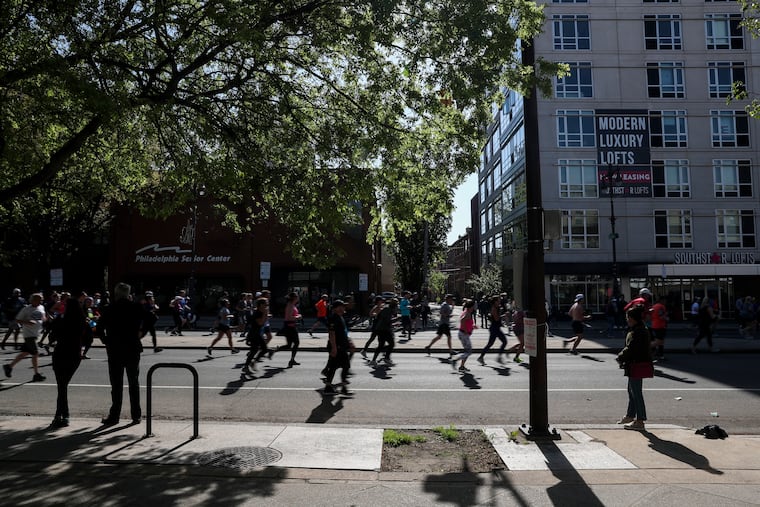The Broad Street Run will offer prizes to the fastest nonbinary athletes this year. Runners hope other races follow suit.
This year, the Broad Street Run nonbinary runners will be eligible for equal prizes offered to their male and female competitors for the first time. Runners hope other races follow suit.

Early-morning runs, increasing protein intake, and managing injuries are common hurdles in training for a race, whether it be a turkey trot or marathon. But for nonbinary runners, athletes who don’t exclusively identify as a woman or man, choosing a category when registering for a race can be an added stressor.
“I do spend some mental energy before I register for a race like that,” said nonbinary Swarthmore-area runner Jacklyn Vasko, 40.
For nonbinary athletes running at a competitive pace, that feeling only intensifies if they earn a spot on a podium, eligible for a monetary prize. Vasko recalled being pulled aside by race organizers, who thought Vasko had mistakenly collected a prize in the male category.
This year, nonbinary runners in the Independence Blue Cross Broad Street Run will be eligible for prizes equal to those offered to their male and female competitors for the first time, which runners say is a significant step from a popular race in making the sport more inclusive. Some race organizers say they need more time to figure out nonbinary awards and qualifying times, and athletics governing bodies require athletes to choose between the male and female categories.
This year the Boston Marathon will feature a nonbinary category but they won’t be able to collect prize money. The London Marathon will offer a nonbinary category for athletes in the wider race but elite competitors must choose between male and female.
Locally, the Philadelphia Marathon introduced a nonbinary category for runners last year but offered no prize money for that category.
Still, while some of the world’s most iconic races aim to be more inclusive with a nonbinary category for participants, athletes say that’s not the norm with most races.
Broad Street Run organizers added the nonbinary category in 2022 and with the urging of local LGBTQ+-affiliated running groups and athletes, they’re opening up prizes for the top five nonbinary finishers in the 10-mile race, set for April 30.
According to Philadelphia Parks and Recreation Commissioner Kathryn Ott Lovell, it helped that the race has less bureaucratic red tape to cross.
Ott Lovell said race organizers were able to offer awards “relatively easily, without coordination with governing organizations that have not recognized nonbinary gender category at this time.”
And Parks and Rec had a blueprint. The first U.S. road race to offer a nonbinary category for runners and equal prizes among all categories was the 2021 Philadelphia Distance Run, according to Runner’s World.
“I think it’s a fairly easy thing for [races] to do in general, there’s not any compelling reason not to do it,” said Ross Martinson, owner of Philadelphia Runner and one of the organizers of the Philadelphia Distance Run, which includes a 5K and half marathon.
Parks and Recreation said it was through the example set by organizers such as PDR, that the department knew it could address the request of awards.
Philly runner Josh Fernandez, 35, said PDR gave nonbinary athletes the opportunity to meet other like-minded, competitive athletes.
“Not only did I get to bring my full self at the starting line of the race, I got to podium,” placing third, they said. “I was recognized not just by my gender identity but also being awarded as male and female peer runners.”
Fernandez met Vasko, who also placed at PDR, and the two have been running buddies ever since.
And Broad Street Run’s advertising of the change has not gone unnoticed, especially at a time when transgender athletes and nonbinary athletes spark fierce debate. Last year 29 participants registered as nonbinary for Broad Street; this year 70 did.
Ott Lovell said while the Broad Street run is not the first race to offer awards, it hopes to “set the pace on this issue.”
“We are hopeful that governing bodies like World Marathon Majors and U.S. Track & Field can use our experience as a guide to help set welcoming and identity-affirming policies for the running community,” she said.
D.C.-area runner Aaryn Edge, 29, said they appreciate the effort, having seen some races add the nonbinary category but not actively promote it. Edge, who will be running the Broad Street Run, said organizers have demonstrated “strong allyship” in how they’ve approached changes.
“I know the race is going to be supportive and inclusive and that feels exciting and makes the experience a lot more joyful,” they said.